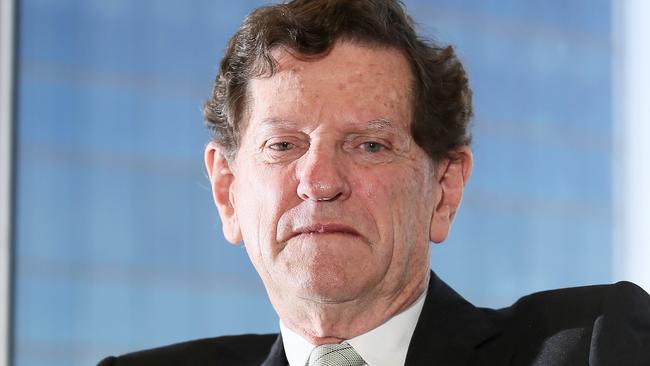Ex-judge Robert French to tackle campus censors
Former High Court chief justice Robert French will conduct a review of freedom of speech at universities.

Former High Court chief justice Robert French will conduct a review of freedom of speech at universities, in the wake of a series of incidents in which contentious debates have been stifled on campuses.
The review, to be unveiled today, is a first step by the Morrison government towards holding universities accountable for restrictions that breach a planned national code of freedom of speech on campus. The development of the national code will be the centrepiece of the review.
The government has given Mr French four months to assess the effectiveness of the framework protecting freedom of speech and to develop a code that will be used by the government as a national benchmark for university performance.
The review comes soon after a series of attempts to close down contentious debates at several universities and a warning by Mr French that it was wrong to use “an extended concept of safety” as an excuse to stifle debate.
This follows attempts at La Trobe University and the University of Sydney to prevent columnist Bettina Arndt from questioning the existence of a “rape culture” at the nation’s universities. The University of Western Australia was also recently forced to cancel a speech by American transgender sceptic Quentin Van Meter after threats from protesters.
Education Minister Dan Tehan yesterday accepted that universities were autonomous and had their own policies and procedures but he believed they should protect “all free speech — even where what is being said may be unpopular or challenging”.
“The best university education is one where students are taught to think for themselves, and protecting freedom of speech is how to guarantee that.
“If necessary the French review could mark the development of an Australian version of the Chicago Statement, which is a voluntary framework that clearly sets out a university’s commitment to promoting freedom of speech,” Mr Tehan said.
The government’s move follows public statements by University of Western Sydney chancellor Peter Shergold and Australian National University chancellor Gareth Evans that universities should be prepared to make tough decisions to protect free speech.
Mr Evans, a former Labor foreign minister, was concerned about the rise of US-style “trigger warnings” alerting students they were about to be confronted with information that might hurt their feelings.
The terms of reference for the French review require the former chief justice to outline realistic and practical options to better promote and protect freedom of expression and freedom of intellectual inquiry in higher-education institutions.
Those options include revision or clarification of the current higher-education standards framework and “the development of a model code or set of principles as a point of reference for the sector”.
The government is not considering giving the code statutory force but is expected to give it the status of a national declaration on freedom of speech that would be used as a benchmark for assessing the practices of the universities. The government is expected to seek explanations from those institutions that impose restrictions that are at odds with the code.
The review’s terms of reference, which extend to freedom of intellectual inquiry, could also lead to greater protection for academics who work in contentious fields.
This could lead to an independent examination of the policies and practices of James Cook University, which dismissed professor Peter Ridd after he questioned academic research on climate change.
According to JCU, Professor Ridd was dismissed because he breached a code of conduct aimed at creating “a safe and respectful” workplace.
The key factor that prompted the government’s review is understood to have been a major address by Mr French on the growing threat to freedom of expression.
The former chief justice warned in September that the threshold test for restricting speech on campus should not be the feelings of others and should be invoked only for matters that amounted to a breach of the law.
Instead of imposing restrictions “in the interests of the feelings of the university community”, he favoured “a robust culture of open speech and discussion, even though it may involve people hearing views that they find offensive or hurtful”, he said in September.
Mr French said yesterday he had agreed to undertake the review by the government on a co-operative and consultative basis with the university sector “respecting the legitimate institutional autonomy of Australian universities”.
“An important object of the review will be the production of a resource including a model code which can be used as a point of reference in any consideration by universities of their existing rules and guidelines relating to the protection of freedom of speech on campus,” Mr French said.
His review will not take submissions from the public but is expected to seek information from the universities about their policies on free speech.
The review will also assess international approaches to the promotion and protection of free expression and free intellectual inquiry in higher education.


